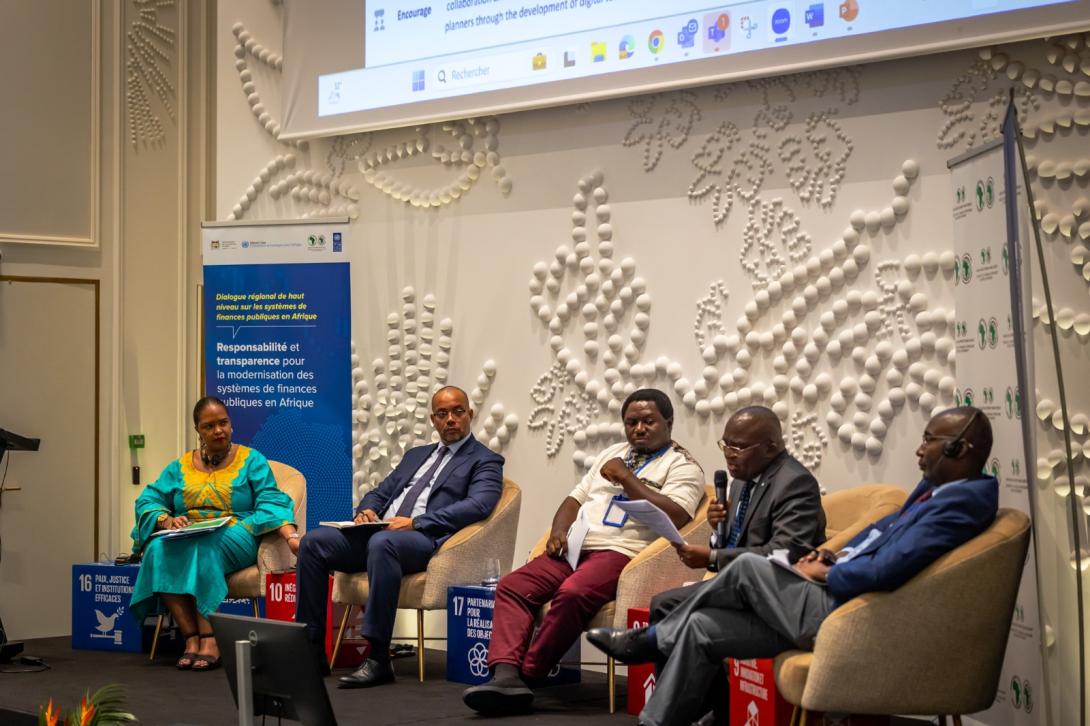High-Level Regional Dialogue on Public Finance Systems in Africa
From the 25th to 26th March 2025, AFRODAD participated in a High-Level Regional Dialogue on Public Finance Systems in Africa, which focused on “Modernizing Accountability and Transparency in Public Finance Systems in Africa.” The dialogue created a platform for high-level discussions among policymakers, development partners, and key stakeholders on enhancing the efficiency, transparency, and accountability of public financial management across the continent. The specific objectives included promoting knowledge exchange and innovation, capacity development and technical solutions for modernizing accountability, building the potential to contribute to formulating policy and governance framework and creating a platform for regional collaboration and harmonization.
During this event, AFRODAD through its Policy Research and Advocacy Manager Yungong Theophilus Jong participated at a session on “Citizen Engagement and Participatory Approaches in modern Public Finance and Debt Management era”. This session focused on some successful approaches and cases of participatory public finance and debt management from across Africa and discuss how technology can enhance citizen involvement, at local and national level, in public financial and debt management decision making while ensuring inclusivity and accessibility.
AFRODAD’s contributions zoomed in on key success factors of participatory budgeting across Africa and how they can be scaled up taking a page from the African Borrowing Charter by AFRODAD which sets out the principles of the responsible borrowing for African countries, advocates for enhanced transparency, citizen involvement through public disclosure and borrowing which puts the interest of citizens.
The intervention touched on the following:
- Responsible borrowing is crucial because debt is a binding contract which affects citizens’ welfare. Hence responsible borrowing should be rooted in the principles of constitutionalism with a significant parliamentary oversight and the rule of law
- Participatory budgeting provides a mechanism for rolling out the principles of the African Borring Charter by AFRODAD
Why participatory borrowing matters
- The current context entails countries looking inward – their interest first and participation provides a significant check to guarantee that the interest of the citizens is taken into account in borrowing decisions
- Participatory borrowing and budgeting enforce the principles of accountability and transparency. African countries are often subjected to conditionalities because transparency and accountability are weak and does not create sufficient creditor confidence that governments would pursue policy options that guarantee debt sustainability. Such considtionalities end up hurting citizens’ welfare the most
- Participatory borrowing and budgeting are critical in winning creditor confidence and establish the reputation that can provide African countries the voice to be a rule makers and not a rule takes in the global financial system.
Success Factors for participatory budgeting
- Participatory budgeting and borrowing should be rooted in sound institutional and legal frameworks. They should reflect recommendations outlined in the African Borrowing Charter – which recommends debt management based on the principles of constitutionalism. Participatory process should not be a discretionary option by governments but supported by constitution and enabling legal architecture – legislation that makes participatory budgetary mandatory for central and regional governments
- Public awareness and an informed citizenry – for them to be able understand and read budgets. This also includes the human and infrastructure resources required to support participatory budgeting
- Involvement of civil society in monitoring in monitoring budget, promoting public education and citizen engagement in budgetary processes
- Other enablers include enhanced DRM – to provide the budgets required. Curbing IFFs, resource-based industrialisation for African countries, responsible borrowing and investment are basis for improving revenue streams required for budgeting
- However, participatory budgeting is not just something that can be prescribed. It requires significant political will especially with politics of state capture, clientelism and institutionalized corruption that has become a rampant practice, not putting citizens at the heart of development policy. The fear of losing financial resources and decisions on financing and budgeting issues.
Generating political will
- Bringing about the political will is an uphill task on its own. It is more than just being prescriptive
- Some strategies have include using campaigns to drive change from the base, mass education of the citizens through the media to demand for accountability and transparency
- AFRODAD currently runs a Media Development Initiative – AFROMEDI – that seeks to build the capacity of journalists on debt reporting, humanising debt stories, running the stop the bleeding campaign – all to enhance public understanding through the media
- Generating political will also requires progressive CSOs and CSO coordination to avoid fragmentation in CSO calls

